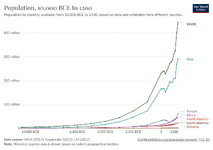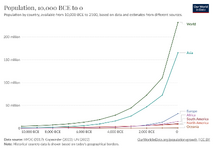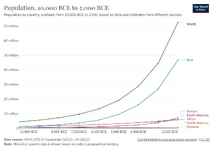You refuse to tell us which you would prefer if you were faced with the two options.
But, if you say that, when faced with the two options, that the choice to reduce population is the wrong answer, then that is the same thing as stating that you prefer reducing affluence if faced with that choice.
It's a loaded question.
We are not face with that choice, and are never likely to be. I refuse to state a preference, because to do so would imply accepting the hidden premise that such a choice is possible, or even plausible. It's not.
LOL! I shared a peer-reviewed paper with you that argued that we needed to limit consumption. That paper referenced multiple peer-reviewed papers that said the same thing. Yes, peer-reviewed papers are sometimes wrong, and you have the right to dispute them. But how can you tell us that you not only refuse to accept the conclusion of this article, but you refuse to accept it is even possible, and refuse to accept it is even plausible?
I reference other peer-reviewed articles that say the same thing.
What do you offer as a counter? What do you have to prove that Wiedmaan et. al. are wrong? We have nothing but your quips and cartoons declaring that you are right, and the opposing evidence cannot possibly be right.
If Wiedmann, et. al., are right then we need to limit consumption. If we need to limit consumption, and consumption is equal to the population times the average consumption-per-capita, then we would need to decide if we would address this by limiting population, limiting consumption-per-capita or both. But you refuse to answer that question, because you refuse to admit that there is any possibility that Wiedmann, et. al. might be right.
Once again, this reminds me of my satire of the blind faith of Habakkuk.
17 Although the fig tree shall not blossom, neither shall fruit be in the vines; the labour of the olive shall fail, and the fields shall yield no meat; the flock shall be cut off from the fold, and there shall be no herd in the stalls:
18 Yet I will rejoice in Nuclear Power, I will joy in the God of my salvation.
19 Nuclear Power is my strength, and he will make my feet like hinds' feet, and he will make me to walk upon mine high places.
-- Habakkuk 3:17-19, Saint Bilby Version





